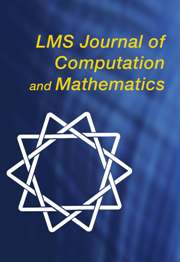Article contents
A comprehensive perturbation theorem for estimating magnitudes of roots of polynomials
Published online by Cambridge University Press: 14 February 2013
Abstract
A comprehensive new perturbation theorem is posed and proven to estimate the magnitudes of roots of polynomials. The theorem successfully determines the magnitudes of roots for arbitrary degree of polynomial equations with no restrictions on the coefficients. In the previous papers ‘Pakdemirli and Elmas, Appl. Math. Comput. 216 (2010) 1645–1651’ and ‘Pakdemirli and Yurtsever, Appl. Math. Comput. 188 (2007) 2025–2028’, the given theorems were valid only for some restricted coefficients. The given theorem in this work is a generalization and unification of the past theorems and valid for arbitrary coefficients. Numerical applications of the theorem are presented as examples. It is shown that the theorem produces good estimates for the magnitudes of roots of polynomial equations of arbitrary order and unrestricted coefficients.
- Type
- Research Article
- Information
- Copyright
- © The Author(s) 2013
References
- 1
- Cited by




